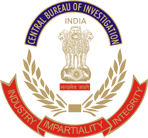What is the full form of CBI(i) CBI: Central Bureau of InvestigationCBI stands for Central Bureau of Investigation. It is a government organization of India that looks into security and serves as a criminal investigation body. It is headquartered in New Delhi. The head of the CBI is usually a senior IPS officer. Other officers of CBI, including the Superintendent of Police, Deputy Inspector General of Police, Sub-Inspector, and Constables, work under him. Subodh Kumar Jaiswal is the director of CBI. He is a 1979 batch IPS officer of the Arunachal Pradesh-Goa-Mizoram and Union Territories (AGMUT) cadre. CBI works under the Prime Minister of India. Its motto is "Industry, Impartiality, and Integrity". 
HistoryIt was established in 1941 as the Special Police Establishment to manage domestic security. Later, it was renamed CBI on 1st April 1963. The first director of CBI was D.P. Kohli. In 1965, it was entrusted with a few more responsibilities like investigation of economic offenses and conventional crimes like murders, kidnapping, and crimes related to terrorism. In 1987, it was decided that there would be two separate investigation divisions in the CBI, Anti-Corruption Division and the Special Crimes Division. What does CBI do
What Sort of Cases Does the CBI Handle?Bogus Indian currency notes, bank scams, cyber-crime, violations of import, export, and foreign currency exchange laws, large-scale drug trafficking, the smuggling of antiquities, cultural property, and other contraband items, etc. Special Crimes - Special Crimes include cases of terrorism, bomb blasts, abduction for ransom, and crimes committed by the mafia/underworld. These cases are investigated in compliance with the Indian Penal Code as well as other legislation at the requests of State Governments or on orders from the Supreme Court and High Courts. Suo Moto Cases - The CBI can only suo moto investigate crimes in Union Territories. The assent of the State Government in question is required before the Central Government can give the CBI permission to probe a crime in a State. The Supreme Court and High Courts, however, have the authority to order the CBI to investigate a crime anywhere in the country without the consent of the State. What Obstacles Does the CBI Face?Delayed Investigations: It has come under fire for allegedly taking a very long time to wrap up inquiries. One example is the lethargy in its inquiry of the high dignitaries in the Jain hawala diary case of the 1990s. Lack of Public Accountability: Because CBI is exempt from the laws of the Right to Information Act, it lacks public accountability. Acute staffing shortage: The Government's gross mismanagement of the CBI's workforce through a system of ineffective and puzzlingly biased recruitment policies is a key contributor to the shortfall. Limitations: The State Government must give its approval before CBI members can conduct investigations, which places restrictions on their authority. Access Restrictions: A huge barrier to tackling corruption at larger levels of bureaucracy is receiving prior consent from the Central Government in order to begin an investigation or inquiry into Central Government officials at the level of Joint Secretary and above. (ii) CBI: Central Bank of IndiaCentral Bank of India is a Government owned bank. It is one of the oldest and largest commercial banks in India. It is headquartered in Mumbai. This bank has 4600 branches and more than 5000 ATMs all over India. It is one of the 18 Public sector banks in India. It has overseas offices in Nairobi and Hong- Kong and is approaching to Reserve Bank of India to open representative offices in five more locations: Singapore, Dubai, Doha, and London. Sh. Rajeev Rishi is the current (as of July 2017) Chairman and Managing Director of the Central Bank of India. 
HistoryThis bank was founded on 21 December 1911 by Sorabji Pochkhanawala and, Pherozeshah Mehta was its first chairman. In 1969, the Government of India nationalized this bank. Some of its pioneering services are given below:
Awards and Achievements
Next TopicFull Form
|
 For Videos Join Our Youtube Channel: Join Now
For Videos Join Our Youtube Channel: Join Now
Feedback
- Send your Feedback to [email protected]
Help Others, Please Share










